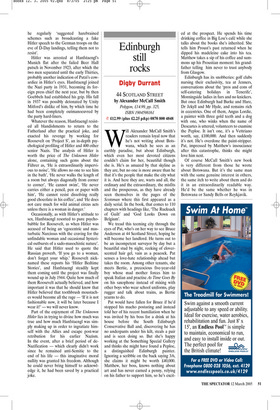Edinburgh still rocks
Digby Durrant
44 SCOTLAND STREET by Alexander McCall Smith Polygon, £14.99, pp. 325, ISBN 1904598161 ✆ £12.99 (plus £2.25 p&p) 0870 800 4848 Will Alexander McCall Smith’s eaders remain loyal now that he’s not writing about Botswana, which he sees as an earthly paradise, but about Edinburgh, which even her most devoted citizens couldn’t claim for her, beautiful though she is. He’s as amazed by that skyline as they are, but no one is more aware than he that it’s the people that make the city what it is. And here they are, warts and all, the ordinary and the extraordinary, the misfits and the prosperous, as they have already seen themselves in the pages of the Scotsman where this first appeared as a daily serial. In the book, that comes to 110 chapters with headings like, ‘The Rucksack of Guilt’ and ‘God Looks Down on Belgium’.
We tread this teeming city through the eyes of Pat, who’s on her way to see Bruce Anderson at 44 Scotland Street, hoping he will become her landlord. He turns out to be an incompetent surveyor by day but a beautiful stud by night, reeking of cloverscented hair gel, vain as a peacock. Pat senses a love-hate relationship ahead but takes the room. Among other tenants, she meets Bertie, a precocious five-year-old boy whose mad mother forces him to speak Italian and practise As Time Goes By on his saxophone instead of mixing with other boys who wear school uniforms, play rugger and talk about trains, as Bertie yearns to do.
Pat would have fallen for Bruce if he’d stopped his macho posturing and instead told her of his recent humiliation when he was invited by his boss for a drink at his house before the South Edinburgh Conservative Ball and, discovering he has no underpants under his kilt, steals a pair and is seen doing so. But she’s happy working at the Something Special Gallery and thinks she might have found a Peploe, a distinguished Edinburgh painter. Ignoring a scribble on the back saying 3/6, she claims it might be worth £40,000. Matthew, her boss, knows nothing about art and has never earned a penny, relying on his father to support him, so he’s excit ed at the prospect. He spends his time drinking coffee in Big Lou’s café while she talks about the books she’s inherited. She tells him Proust’s past returned when he dipped his madeleine cake into his tea. Matthew takes a sip of his coffee and summons up his Proustian moment: his grandfather telling him never to trust anybody from Glasgow.
Edinburgh has its snobberies: golf clubs nursing their exclusivity, tea at Jenners, conversations about the ‘pros and cons of self-catering holidays in Tenerife’, Morningside ladies in furs and no knickers. But once Edinburgh had Burke and Hare, Dr Jekyll and Mr Hyde, and remains rich in eccentrics. One of them, Angus Lordie, a painter with three gold teeth and a dog with one, who winks when the name of Descartes is uttered, volunteers to examine the Peploe. It isn’t one, it’s a Vettriano worth, say, £100,000. And then suddenly it’s not. He’s overdone the paint-stripper. Pat, impressed by Matthew’s insouciance after this catastrophe, thinks she might love him next.
Of course McCall Smith’s new book is very different from those he wrote about Botswana. But it’s the same man with the same genuine interest in others, the same itch to write about them and do it in an extraordinarily readable way. He’d be the same whether he was in Botswana or Sandy Bells or Reykjavik.
































































 Previous page
Previous page